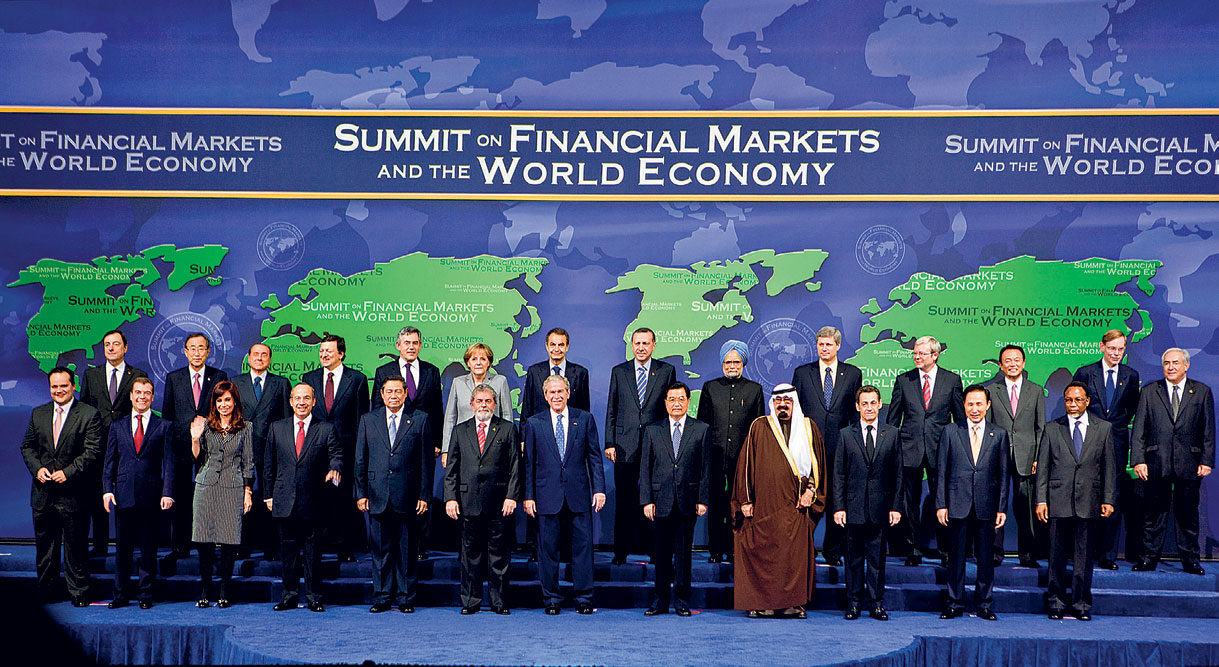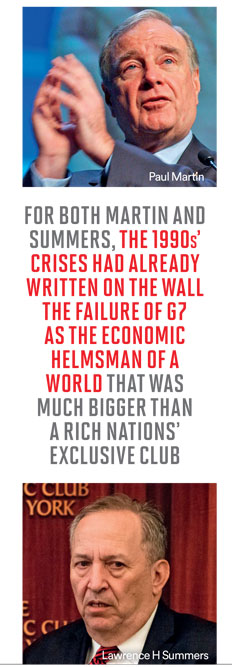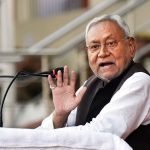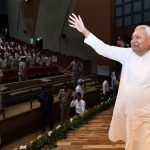Born In Crisis, Grown In Power
G20 has expanded its agenda since 1999 and survived persistent challenges to its legitimacy
 Sudeep Paul
Sudeep Paul
 Sudeep Paul
Sudeep Paul
 |
07 Sep, 2023
|
07 Sep, 2023
/wp-content/uploads/2023/09/Crisis1.jpg)
(L-R) Fumio Kishida, Narendra Modi, Emmanuel Macron, Joko Widodo and Anthony Albanese on the sidelines of the G20 summit in Bali, November 16, 2022 (Photo: AP)
IN THE SPRING of 1999, the skeleton of the Group of 20 or G20 took shape on the back of a brown manila envelope passed back and forth between two men sitting in a big office in Washington DC. They had a series of interlinked crises at hand snowballing into one big crisis that those holding the reins of the global economy appeared less and less adept at solving. Because Western bankers and political leaders didn’t grasp the cause, they couldn’t control the effect.
In December 1994, the Mexican government suddenly devalued the peso against the US dollar and triggered a capital flight. The contagion of the 1990s’ international debt crises had begun. Less than three years later, in July 1997, began the Asian financial crisis that spread from Thailand and overwhelmed Southeast and much of East Asia. A year later, in August 1998, the Russian financial crisis began that would lead to a devaluation of the rouble against the dollar and Moscow’s eventual default on its debt.
When Paul Martin, the then Canadian finance minister and later prime minister, met Lawrence (Larry) H Summers in the latter’s DC office in April 1999, Summers was a couple of months from taking over as US treasury secretary. But for both men, the 1990s’ crises had already written on the wall the failure of the Group of Seven or G7 as the economic helmsman of a world that was much bigger than a rich nations’ exclusive club. Martin was adamant that the emerging economies had to be brought in and made part of decisions that affected the global economy. Summers agreed and the two began listing which nations would be in and which out. The criteria included the size of GDP but not necessarily at the top. Geopolitics—who had regional weight and who didn’t, who could be useful—played an equally important role for countries that were not obvious choices like China, India, Brazil, South Africa and Mexico.
One of the early comprehensive articles on G20, ‘Global Economic Governance at a Crossroads: Replacing the G-7 with the G-20’ by Colin Bradford and Johannes Linn (Brookings, April 1, 2004), had attributed the birth of the group to then German Finance Minister Hans Eichel who hosted the first G20 finance ministers’ meeting. But Bradford would later credit Martin as the main architect, a fact borne out by evidence, anecdotal and academic, that emerged over the first decade of the group’s existence. A June 2010 report in The Globe and Mail, ‘How Canada made the G20 happen’, had Martin recount how Summers and he created what in November 2008 had been elevated to a leadership-level summit in the aftermath of the global financial crisis. That first leaders’ summit in Washington DC was a success, with the participants acting speedily to rescue “a global financial system in free fall”. The G20 members’ decision to spend $4 trillion to
boost their economies, abolish trade barriers and initiate systemic financial reforms—buoyed not least by emerging economies that had remained resilient and/or quickly recovered to preclude domestic recessions—is credited with ensuring the post-Lehman crisis did not come to rival the Great Depression.
Martin would be vindicated. G20 was not necessarily the 20 biggest economies in the world by GDP and it left out 170-odd countries. But it certainly was more representative than G7/G8. Today, the 19 states in G20 and the European Union (EU) account for about 80 per cent of global GDP, 75 per cent of global trade, and almost two-thirds of the global population. And it’s thanks to the emerging economies that these statistics have remained more or stable for G20 while G7 has fallen from a 66 per cent share of global GDP in 1990 to 44 per cent by 2022.
If one crisis had led to the conception of G20, another had led to its elevation to a leadership-level engagement, beyond a meeting of finance ministers and central bankers. That second call was taken, ostensibly, by George W Bush who was in November 2008 a well and truly lame-duck president. But once done, there was no looking back. When Martin met then Indian Prime Minister Manmohan Singh in 2005, the latter had complained about being made to look like a supplicant at the G8 meetings. But nobody apart from Martin himself, who was out of prime ministerial office in 2006, and Britain’s Gordon Brown was genuinely interested in opening the doors of G7 and elevating G20 to a leadership-level summit. According to Martin’s own recollections, Japan’s Junichiro Koizumi had agreed to go along with it but for just one meeting to see if it worked. With Brown’s push, the British were on board but the French “preferred a G13 that would include only China, India, Brazil, Mexico and South Africa.” And Bush himself had reportedly complained about having to go to too many meetings. Apparently, a finance ministerial-level G20 gathering was okay for the G7 leadership; a G20 leadership summit was not. The 2008 crisis changed all that.
One of the clearest markers of G20’s significance is how its agenda has expanded. Macroeconomic policy and financial coordination remain its core concerns, but over the last decade, it has paid a lot of attention to issues like climate change, health and healthcare, etc. The 2016 Hangzhou summit was a beginning of sorts when the US and China announced their accession to the Paris climate agreement. India has tailored the 2023 summit to the necessity of action on climate change, taking off from the extreme weather events across the world, and the problems faced by developing nations and lower-income countries, such as their debt levels and high inflation. Food security, especially in the wake of Russia’s invasion of Ukraine in February 2022 and weather-related crop failures, is also a point of focus.

The opposition to G20 has two fundamental strands: one, the hostility of states that find the grouping not representative enough because it does not include several major economies. Two, the hostility of anti-globalisation activists which often takes the form of anti-capitalism itself after beginning as opposition to fractional reserve-banking. In Toronto in 2010, for example, the rioting around the G20 summit had led to what statistically became the biggest mass arrest in Canada’s history. But it is criticism of G20’s exclusivity that has always called for serious consideration.
In a June 2010 interview to Der Spiegel, Jonas Gahr Støre, Norway’s then foreign minister and current prime minister, had called G20 “one of the greatest setbacks since World War II.” The world did not appoint G20; it appointed itself. Støre elaborated: “The G-20 is a self-appointed group. Its composition is determined by the major countries and powers. It may be more representative than the G-7 or the G-8… but it is still arbitrary. We no longer live in the 19th century, a time when the major powers met and redrew the map of the world. No one needs a new Congress of Vienna.” When countered that G20 was being given additional competencies in climate change, healthcare and development, Støre responded: “It would be a great paradox if the G-20 contributed to undermining the legitimacy of the UN and its institutions. It would mean a further creeping devaluation of the responsible world organizations, if decisions like those of the World Health Organization or the World Trade Organization were in the future effectively made in advance by the G-20.”
Despite its datedness, this has remained the framework of basic criticism of G20 and, in this view, the expanding agenda only ‘de-legitimises’ G20 further. But then, Norway remains a special case. Unlike Spain, which is a permanent invitee to the G20 summits and does not seek membership, Norway is not a member of EU and finds no representation at all. Støre had complained: “South Africa is part of it, but not as a representative of Africa. Saudi Arabia is part of it, but not as a representative of the Arab world. So why is the European Union represented in addition to having four individual EU member states and two others as observers? That is not acceptable.”
The Norwegian solution? “[W]ith a few small adjustments you could achieve a regional representation like that which we have achieved with the International Monetary Fund or the World Bank, among other organizations. We need the kind of strong, smaller alliances, or “voting groups,” of the type that we see, for example, with the Nordic or the Baltic states, so that we can react quickly.” The irony: if G20 was not representative enough, the solution being proposed was still smaller groups which were reputed to act quickly.
Yet, Støre’s 2010 complaint and formula have found a new resonance as the initial cohesion of G20 has worn thin over the second half of the last decade to the point where consensus evades the group on many fronts. Trade and tariff wars in contravention of the declared commitment to WTO principles, the Ukraine war and the question of Russia’s continued participation, the fallout of rising energy prices on poorer nations, the persistent disagreements on fossil fuel subsidies and phasing out of coal, the lukewarm response to the framework for debt treatment in 2020, and, most visibly, the failure of coordinated global action led by G20 after the outbreak of the Covid-19 pandemic, have taken the shine off the group’s early successes. But that’s reason for realism, not pessimism.

If the Norwegians complained that they were the biggest contributors to the UN and World Bank development programmes and, together, the Nordic countries were among the top 10 global economies, Poland’s argument that as an emerging major economy it should be a member of the group, and not represented through EU, has seemed no less legitimate. But then, the Netherlands, a developed major economy, had also been left aggrieved. For now, the membership of the 55-state African Union (AU) is on the agenda, as reiterated by Prime Minister Narendra Modi ahead of the summit on September 9-10. AU’s case is supported by several members since the continent of Africa does not find representation as a bloc.
G20 may expand to G21 after all. But keeping the group capped at 20—19 countries and EU—and yet adding new members by swapping, say, Argentina for Poland (as had been suggested a decade ago in an article in Forbes), remains a possibility in theory although nobody intends to ‘throw’ anyone out. Not yet, despite calls for Russia’s removal—it was thrown out of G7 after the 2014 invasion of Crimea—which overshadowed the 2022 Bali summit and will continue to affect G20 beyond the Delhi summit. The two cases—the inclusion of Poland on economic grounds and the removal of Russia on political grounds—compound an original challenge with a new one.
In a January 2011 essay in Foreign Affairs, Ian Bremmer and Nouriel Roubini had proclaimed: “This is not a G-20 world. Over the past several months, the expanded group of leading economies has gone from a would-be concert of nations to a cacophony of competing voices as the urgency of the financial crisis has waned and the diversity of political and economic values within the group has asserted itself.” Bremmer and Roubini argued that a “G-Zero” world had emerged where states would act alone or form short-term, utilitarian alliances. While the piece was prescient in many ways, it has been rebutted by the very survival of G20. And since 2011, when the financial crisis hadn’t yet fully passed, G20 has grown in stature and ambition. Although it doesn’t have a secretariat or a permanent staff and will continue to battle the question of de jure legitimacy, its de facto legitimacy is not in question because the fact that it is more representative than G7 or any regional or special interest grouping is not in doubt.
The test of a good thing forged in crisis is its success in mitigating subsequent crises. Problems vary in their degrees of complication and the solutions they call for. But what has not changed since 1999 or 2008 is the fact that the global community cannot even begin to frame solutions without cooperation. And any cooperation is better than none. Despite the challenge posed by the Ukraine war, G20 will have to continue its work in trying to make globalisation work for all while never taking its eye off the existential threats to the inhabitants of the planet—livelihood, health, food, climate. If the world is a family, then the members of that family must care for each other.
About The Author
MOst Popular
3

/wp-content/uploads/2025/07/Cover_Crashcause.jpg)










More Columns
Bihar: On the Road to Progress Open Avenues
The Bihar Model: Balancing Governance, Growth and Inclusion Open Avenues
Caution: Contents May Be Delicious V Shoba